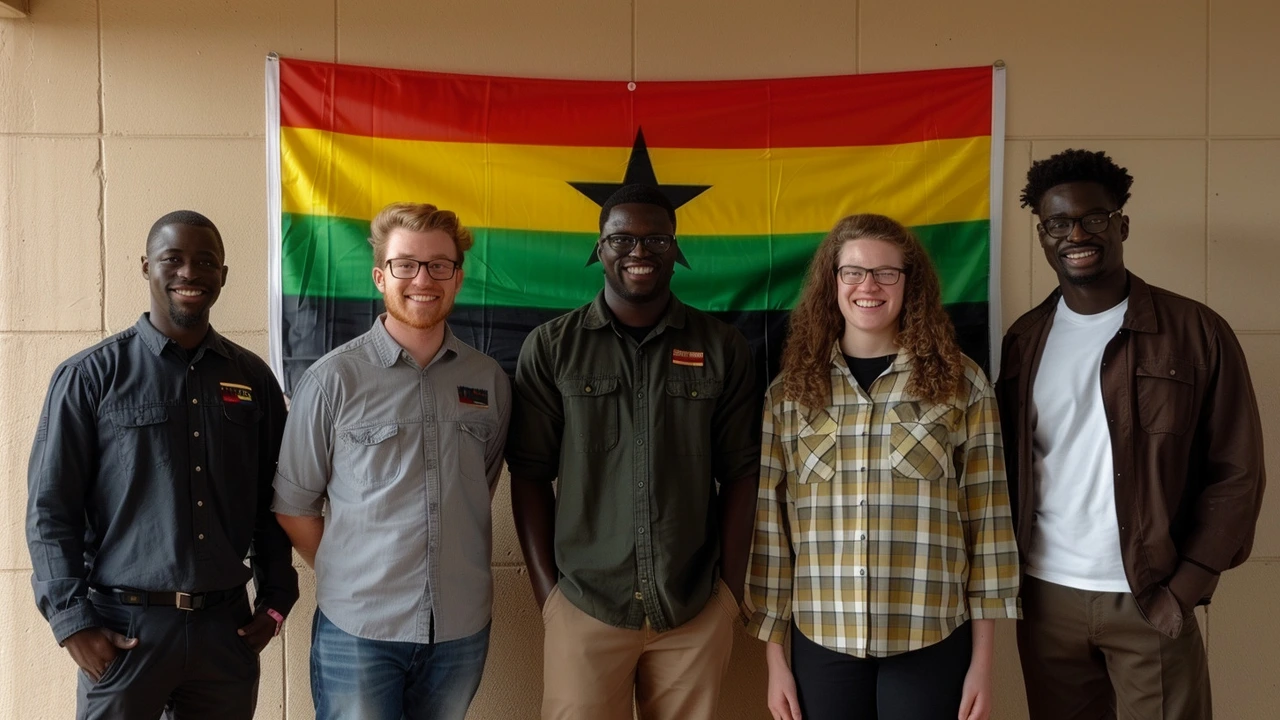The Ghanaian Flag's Role in Global Unity: Discovering National Pride Abroad in Denmark

Encountering a Ghanaian Symbol in an Unexpected Place
Finding a small yet significant piece of home in a foreign land can stir a whirlwind of emotions. For one Ghanaian student studying in Denmark, this came to life in an unexpected encounter with their national flag in the heart of a Copenhagen classroom. The experience was not just about the flag itself but what it represented—a deep sense of joy, pride, and an inextricable connection to one’s roots.
A Flag of Many Colors
It all started in a classroom at the Danish School of Media and Journalism, a place where students from around the world converge to hone their skills in storytelling and media. Amidst the vibrant mix of nationalities and cultures, a Danish student expressed their admiration for the vivid colors of the Ghanaian flag by hanging it up prominently in the room. This seemingly simple action had profound reverberations for the Ghanaian student who stumbled upon it.
The three horizontal stripes of red, gold, and green, adorned with a black star in the middle, instantly caught their eye. The flag wasn’t just a colorful decoration; it was a beacon of home, a reminder of roots, and a symbol of an identity that transcends borders. The flag offered a rare and tangible connection to Ghana, creating a moment of joy and belonging. In the heart of Denmark, surrounded by international peers, this emblem of Ghana was a visual anchor to the student's cultural heritage.
National Symbols: Grounding and Uniting
National symbols like flags wield an incredible power. They are not just pieces of cloth or artistic designs but encapsulations of a country's history, struggles, and triumphs. For those away from their homeland, such symbols become even more significant. They offer a sense of belonging and a link to one's cultural and national identity. They ground individuals in their cultural roots, providing a touchstone that reassures them of their place in the world, no matter how far they roam.
In a globalized world, the role of national symbols extends beyond personal identity. They serve as bridges that foster inclusivity and global awareness. For the Ghanaian student in Denmark, the flag became a conversation starter, prompting discussions not only about Ghana but about the myriad ways in which people can connect across cultures. It highlighted the universal human experiences that transcend geographical boundaries.
The Transformative Journey Abroad
Living and studying abroad is an experience that reshapes perspectives. The Ghanaian student’s journey in Denmark, marked by encounters with peers from diverse backgrounds, has been nothing short of transformative. Interactions with a diverse international cohort have enriched their understanding of global dynamics and deepened their appreciation of their own identity. Studying in a setting where cultural exchange is the norm has underscored the interconnectedness of people from different corners of the globe.
Such experiences have a dual impact. On one hand, they fortify one’s sense of self and cultural pride. On the other, they cultivate a spirit of empathy and openness towards others. The Ghanaian flag in the classroom encapsulated this duality perfectly. It stood as a proud symbol of one’s heritage while also being an object of admiration for others, thereby promoting a sense of shared humanity.
Reflecting on Identity and Unity
The presence of the Ghanaian flag in a Danish classroom is a testament to the power of national symbols to inspire unity. It serves as a reminder that while we come from different backgrounds, there is much that unites us. Flags, as embodiments of national identity, can spark curiosity, dialogue, and connection. They help ground us in our own stories while also opening the door to a broader understanding and appreciation of others.
This encounter with the Ghanaian flag also prompts a deeper reflection on the nature of identity in a globalized world. As people move across borders and cultures intermingle, what does it mean to belong? How does one balance the pride in their national identity with the need to embrace a global perspective? The Ghanaian student’s experience in Denmark offers a microcosm of this broader narrative.
Embracing Cultural Symbols for Global Understanding
The article culminates in a powerful message: the importance of embracing and sharing cultural symbols. In an increasingly interconnected world, such symbols can play a pivotal role in fostering inclusivity and understanding. The Ghanaian flag, proudly displayed in a Danish classroom, bridges gaps and unites people in their shared humanity. It serves as a reminder that while our individual journeys and identities are unique, they are also part of a larger, interconnected tapestry.
The Ghanaian student's experience underscores a universal truth: that embracing and celebrating our cultural symbols enriches everyone's lives. It encourages us to be open, to share our stories, and to connect with others on a deeper level. In doing so, we create a more inclusive, understanding, and united world.